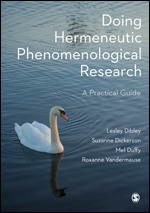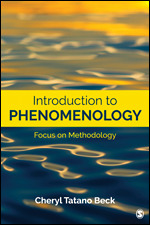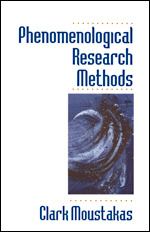Qualitative Methodologies: Phenomenology
What is Phenomenology?
Here is a brief overview from The SAGE encyclopedia of qualitative research methods:
Phenomenology is the reflective study of prereflective or lived experience. To say it somewhat differently, a main characteristic of the phenomenological tradition is that it is the study of the lifeworld as we immediately experience it, prereflectively, rather than as we conceptualize, theorize, categorize, or reflect on it. Phenomenology is now commonly considered to be one of the alternative qualitative research methodologies to which researchers can turn. But phenomenology is also a term that can carry quite different meanings depending on theoretical and practical contexts.
Originally, phenomenology was the name for the major movement in philosophy and the humanities in continental Europe in the 20th century. More recently, the term has acquired a broader meaning as phenomenology has been developed as a human science that is employed in professional disciplines such as education, health science, clinical psychology, and law. Phenomenological research is the study of lived or experiential meaning and attempts to describe and interpret these meanings in the ways that they emerge and are shaped by consciousness, language, our cognitive and noncognitive sensibilities, and by our preunderstandings and presuppositions. Phenomenology may explore the unique meanings of any human experience or phenomenon. For example, it may study what it is like to have a conversation, how students experience difficulty in learning something, how pain is experienced in childbirth, what it is like to experience obsessive compulsions, how young people begin to experience secrecy and inwardness, and so forth.
Interpretive phenomenology, also called hermeneutical phenomenology, is based on the assumption that humans are interpretation through and through. Humans dwell in the world with no capacity to be completely free of the world. Interpretive phenomenology holds that there is no access to brute data (i.e., data containing no presuppositions or preunderstandings). Human science mirrors humans in that humans are the kind of beings who allow other beings to be revealed and known. Interpretive phenomenology can be contrasted with transcendental phenomenology that seeks to reduce things down to their essence—their least interpreted essence of a thought or mental process. Transcendental phenomenology seeks to bracket presuppositions and try to approach something as though one had no prior experiences, ideas, suppositions, or expectations.
Given, L. M. (2008). The SAGE encyclopedia of qualitative research methods (Vols. 1-0). Thousand Oaks, CA: SAGE Publications, Inc. doi: 10.4135/9781412963909
Open Access Phenomenological Studies
Frechette, J., Bitzas, V., Aubry, M., Kilpatrick, K., & Lavoie-Tremblay, M. (2020). Capturing Lived Experience: Methodological Considerations for Interpretive Phenomenological Inquiry. International Journal of Qualitative Methods. https://doi.org/10.1177/1609406920907254
Abstract. Interpretive phenomenology presents a unique methodology for inquiring into lived experience, yet few scholarly articles provide methodological guidelines for researchers, and many studies lack coherence with the methodology’s philosophical foundations. This article contributes to filling these gaps in qualitative research by examining the following question: What are the key methodological and philosophical considerations of leading an interpretive phenomenological study? An exploration of interpretive phenomenology’s foundations, including Heideggerian philosophy and Benner’s applications in health care, will show how the philosophical tradition can guide research methodology. The interpretive phenomenological concepts of Dasein, lived experience, existentialia, authenticity are at the core of the discussion while relevant methodological concerns include research paradigm, researcher’s stance, objective and research question, sampling and recruitment, data collection, and data analysis. A study of pediatric intensive care unit nurses’ lived experience of a major hospital transformation project will illustrate these research considerations. This methodological article is innovative in that it explicitly describes the ties between the operational elements of an interpretive phenomenological study and the philosophical tradition. This endeavor is particularly warranted, as the essence of phenomenology is to bring to light what is taken for granted, and yet phenomenological research paradoxically makes frequent assumptions concerning the philosophical underpinnings.
Groenewald, T. (2004). A Phenomenological Research Design Illustrated. International Journal of Qualitative Methods, 42–55. https://doi.org/10.1177/160940690400300104
Abstract. This article distills the core principles of a phenomenological research design and, by means of a specific study, illustrates the phenomenological methodology. After a brief overview of the developments of phenomenology, the research paradigm of the specific study follows. Thereafter the location of the data, the data-gathering the data-storage methods are explained. Unstructured in-depth phenomenological interviews supplemented by memoing, essays by participants, a focus group discussion and field notes were used. The data explicitation, by means of a simplified version of Hycner's (1999) process, is further explained. The article finally contains commentary about the validity and truthfulness measures, as well as a synopsis of the findings of the study.
Also see: Groenewald, T. (2018). Reflection/Commentary on a Past Article: “A Phenomenological Research Design Illustrated”: http://journals.sagepub.com/doi/full/10.1177/160940690400300104. International Journal of Qualitative Methods. https://doi.org/10.1177/1609406918774662
Laverty, S. M. (2003). Hermeneutic Phenomenology and Phenomenology: A Comparison of Historical and Methodological Considerations. International Journal of Qualitative Methods, 21–35. https://doi.org/10.1177/160940690300200303
Abstract. Hermeneutic phenomenology and phenomenology have become increasingly popular as research methodologies, yet confusion still exists about the unique aspects of these two methodologies. This article provides a discussion of the essential similarities and differences between hermeneutic phenomenology and phenomenology from historical and methodological perspectives. Consideration is given to the philosophical bases, assumptions, focus of research and research outcomes that differentiate these approaches.
Nicholls, C. D. (2019). Innovating the Craft of Phenomenological Research Methods Through Mindfulness. Methodological Innovations. https://doi.org/10.1177/2059799119840977
Abstract. To conduct qualitative social research requires not only a declarative knowledge of the research methods and methodology, but also a set of honed practical, applied skills. For beginning researchers, particularly those undertaking phenomenological research, the skills of bracketing, the phenomenological reductions and having an awareness of one’s positionality or relationship to their chosen research methods, participants and contexts is of significant importance. More generally, these skills are also required in other qualitative research disciplines under the guise of reflexivity or critical reflective practice. Regardless, these are notoriously slippery and require more than prior reading to translate from theory and philosophy into practice. There is literature which also identifies and highlights the disparity between theory, skill development and practice; however, these practicalities of how one can bracket or bridle and undertake reductions require further elaboration and guidance for how researchers can develop these applied skills of research. In this article, I propose and demonstrate that the therapeutic tradition of mindfulness as specifically practised in dialectical behaviour therapy can be used to de-mystify the practices of reflexivity and work specifically within the tradition of phenomenological reduction and bracketing. I also assert that this innovation can provide a practical tool to craft qualitative and phenomenological research and make achievable the original philosophical ideas which underpin phenomenological research. I begin by focusing on the theory of bracketing and reduction from the philosophic tradition of phenomenology as a framework for research methodology and methods, and then introduce the practical skill of mindfulness as prescribed in dialectical behaviour therapy as an innovation which can assist the researcher in developing these skills. I finish by illustrating the usefulness of mindfulness in undertaking phenomenological research drawing on examples from a current research project.
Suddick, K. M., Cross, V., Vuoskoski, P., Galvin, K. T., & Stew, G. (2020). The Work of Hermeneutic Phenomenology. International Journal of Qualitative Methods. https://doi.org/10.1177/1609406920947600
Abstract. This paper is an illustration of the application of a hermeneutic phenomenological study. The theory of meaning and interpretation, drawing on philosophical hermeneutics and the work of Gadamer and Heidegger, and its alignment with phenomenological thought is presented. The paper explains and aims to make visible how key concerns in relation to the fusion of horizons, hermeneutic understanding, hermeneutic circle and hermeneutic phenomenological attitude were implemented. The purpose is to provide practical guidance and illustrate a fully worked up example of hermeneutic phenomenological work as research praxis. This present paper makes a case that hermeneutic phenomenological work is detailed, lengthy, rigorous and systematic in its own philosophical and theoretical frame. It articulates the philosophical and methodological alignment of hermeneutics in a specific hermeneutic phenomenological study and makes visible the work of hermeneutic phenomenology. It concludes by sharing key reflections and insights on the hermeneutic phenomenological process.
Vagle, M. D., Thiel, J. J., & Hofsess, B. A. (2020). A Prelude—Unsettling Traditions: Reimagining the Craft of Phenomenological and Hermeneutic Inquiry. Qualitative Inquiry, 26(5), 427–431. https://doi.org/10.1177/1077800419829791
Note: Articles in this special issue might require subscription to access.
Abstract. In composing this editorial introduction for a special issue of Qualitative Inquiry that reimagines the craft of phenomenological and hermeneutic inquiry, we are flooded with a sense of excitement for this moment in qualitative inquiry. There are a plethora of ontologies and methodologies to learn about, engage and wrestle with, and practice. There are innumerable opportunities to discuss, debate, and challenge our understandings and perspectives about what counts as qualitative inquiry; for whom qualitative inquiry should serve; and the politics, ethics, and purposes of qualitative inquiry, to name a few. As guest editors, the work of bringing together a diverse body of scholarship that unsettles our understandings of phenomenological and hermeneutic inquiry became an opportunity not only to examine what qualitative inquiry was or is but also to further explore how such traditions invite and provoke something new.
Books on Phenomenology from SAGE Publications

Doing Hermeneutic Phenomenological Research: A Practical Guide
by Lesley Dibley, Suzanne Dickerson, Mel Duffy, Roxanne Vandermause
Published: October 2020



How to Write a Phenomenological Dissertation:
A Step-by-Step Guide
by Katarzyna Peoples
Published: February 2020










Informed consent is the term given to the agreement between researcher and participant. In this post Janet Salmons offers suggestions about the intersections of the Internet communications, ethics and participants.